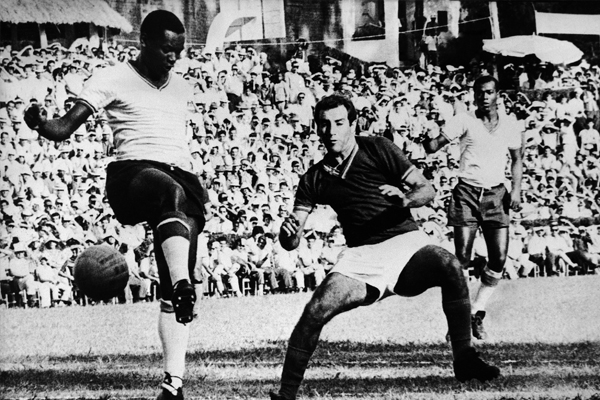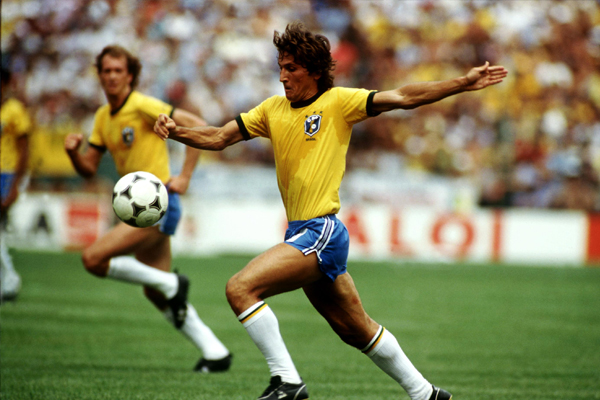7. Leonidas

AP/Press Association ImagesThe original Brazil World Cup hero, so-called Black Diamond Leonidas da Silva defied the racial prejudices of the 1930s to become the star of the blossoming national side. After winning back to back Rio championships with Vasco da Gama and Botafogo, Leonidas' 1936 move to the white elitist Flamengo was a sign of the acceptance of black stars in the top Brazilian clubs. Leonidas repaid that faith with 153 goals in 149 games for the Big Mengo in a career that saw him score an impressive total of 516 club goals in 574 games. The prolific striker played in 19 games for the national team including the 1934 and 38 World Cups, scoring 21 goals. In 1938 Leonidas was the first of seven Brazil players to win the Golden Ball as player of the tournament and the first of 5 Brazilians to win the Golden Boot as top scorer. Leonidas scored 5 times to take Brazil to the semi-finals, whereupon his manager rested him for the game against eventual champions Italy. The Italians won and Leonidas returned to score twice more in the third place playoff. More than this, though, he also gifted the world the bicycle kick, which was so unseen when Leonidas fired one in during the 1938 tournament that the referee wasn't even sure if it was legal.
6. Zico

Peter Robinson/EMPICS SportDescribed by Pele as: "the one player that came closest to me", described by fans as "the White Pele", Zico was perhaps the finest player in the world in the early 1980s, a goalscoring and creative attacking midfielder who embodied the attacking flair of the sadly unsuccessful 1982 Brazil team. The star of Flamengo during their Golden Age, Zico scored 123 times in 212 games in his first spell at the club, winning 7 state championships, 4 Brazilian national championships and the Copa Libertadores in 1981. Unfortunately, despite the obvious talent of Zico and his teammates, Brazil never quite managed to triumph in his era, finishing 3rd in 1978, reaching the second group stage in 1982 and losing the quarter final on penalties in 1986. Despite this, however, Zico finished third top scorer with 4 and was named in the tournament Dream Team in 1982. With 48 goals overall, he is Brazil's fourth top scorer. World Soccer named Zico World Player of the Year in 1981 and 1983 and he finished 14th on the FIFA Player of the Century list. Finishing his playing career in Japan, where he became known as "The God of Soccer", Zico managed the Japan national team to the 2006 World Cup. He is now working as a consultant with the Brazil team.
 AP/Press Association ImagesThe original Brazil World Cup hero, so-called Black Diamond Leonidas da Silva defied the racial prejudices of the 1930s to become the star of the blossoming national side. After winning back to back Rio championships with Vasco da Gama and Botafogo, Leonidas' 1936 move to the white elitist Flamengo was a sign of the acceptance of black stars in the top Brazilian clubs. Leonidas repaid that faith with 153 goals in 149 games for the Big Mengo in a career that saw him score an impressive total of 516 club goals in 574 games. The prolific striker played in 19 games for the national team including the 1934 and 38 World Cups, scoring 21 goals. In 1938 Leonidas was the first of seven Brazil players to win the Golden Ball as player of the tournament and the first of 5 Brazilians to win the Golden Boot as top scorer. Leonidas scored 5 times to take Brazil to the semi-finals, whereupon his manager rested him for the game against eventual champions Italy. The Italians won and Leonidas returned to score twice more in the third place playoff. More than this, though, he also gifted the world the bicycle kick, which was so unseen when Leonidas fired one in during the 1938 tournament that the referee wasn't even sure if it was legal.
AP/Press Association ImagesThe original Brazil World Cup hero, so-called Black Diamond Leonidas da Silva defied the racial prejudices of the 1930s to become the star of the blossoming national side. After winning back to back Rio championships with Vasco da Gama and Botafogo, Leonidas' 1936 move to the white elitist Flamengo was a sign of the acceptance of black stars in the top Brazilian clubs. Leonidas repaid that faith with 153 goals in 149 games for the Big Mengo in a career that saw him score an impressive total of 516 club goals in 574 games. The prolific striker played in 19 games for the national team including the 1934 and 38 World Cups, scoring 21 goals. In 1938 Leonidas was the first of seven Brazil players to win the Golden Ball as player of the tournament and the first of 5 Brazilians to win the Golden Boot as top scorer. Leonidas scored 5 times to take Brazil to the semi-finals, whereupon his manager rested him for the game against eventual champions Italy. The Italians won and Leonidas returned to score twice more in the third place playoff. More than this, though, he also gifted the world the bicycle kick, which was so unseen when Leonidas fired one in during the 1938 tournament that the referee wasn't even sure if it was legal.  Peter Robinson/EMPICS SportDescribed by Pele as: "the one player that came closest to me", described by fans as "the White Pele", Zico was perhaps the finest player in the world in the early 1980s, a goalscoring and creative attacking midfielder who embodied the attacking flair of the sadly unsuccessful 1982 Brazil team. The star of Flamengo during their Golden Age, Zico scored 123 times in 212 games in his first spell at the club, winning 7 state championships, 4 Brazilian national championships and the Copa Libertadores in 1981. Unfortunately, despite the obvious talent of Zico and his teammates, Brazil never quite managed to triumph in his era, finishing 3rd in 1978, reaching the second group stage in 1982 and losing the quarter final on penalties in 1986. Despite this, however, Zico finished third top scorer with 4 and was named in the tournament Dream Team in 1982. With 48 goals overall, he is Brazil's fourth top scorer. World Soccer named Zico World Player of the Year in 1981 and 1983 and he finished 14th on the FIFA Player of the Century list. Finishing his playing career in Japan, where he became known as "The God of Soccer", Zico managed the Japan national team to the 2006 World Cup. He is now working as a consultant with the Brazil team.
Peter Robinson/EMPICS SportDescribed by Pele as: "the one player that came closest to me", described by fans as "the White Pele", Zico was perhaps the finest player in the world in the early 1980s, a goalscoring and creative attacking midfielder who embodied the attacking flair of the sadly unsuccessful 1982 Brazil team. The star of Flamengo during their Golden Age, Zico scored 123 times in 212 games in his first spell at the club, winning 7 state championships, 4 Brazilian national championships and the Copa Libertadores in 1981. Unfortunately, despite the obvious talent of Zico and his teammates, Brazil never quite managed to triumph in his era, finishing 3rd in 1978, reaching the second group stage in 1982 and losing the quarter final on penalties in 1986. Despite this, however, Zico finished third top scorer with 4 and was named in the tournament Dream Team in 1982. With 48 goals overall, he is Brazil's fourth top scorer. World Soccer named Zico World Player of the Year in 1981 and 1983 and he finished 14th on the FIFA Player of the Century list. Finishing his playing career in Japan, where he became known as "The God of Soccer", Zico managed the Japan national team to the 2006 World Cup. He is now working as a consultant with the Brazil team.